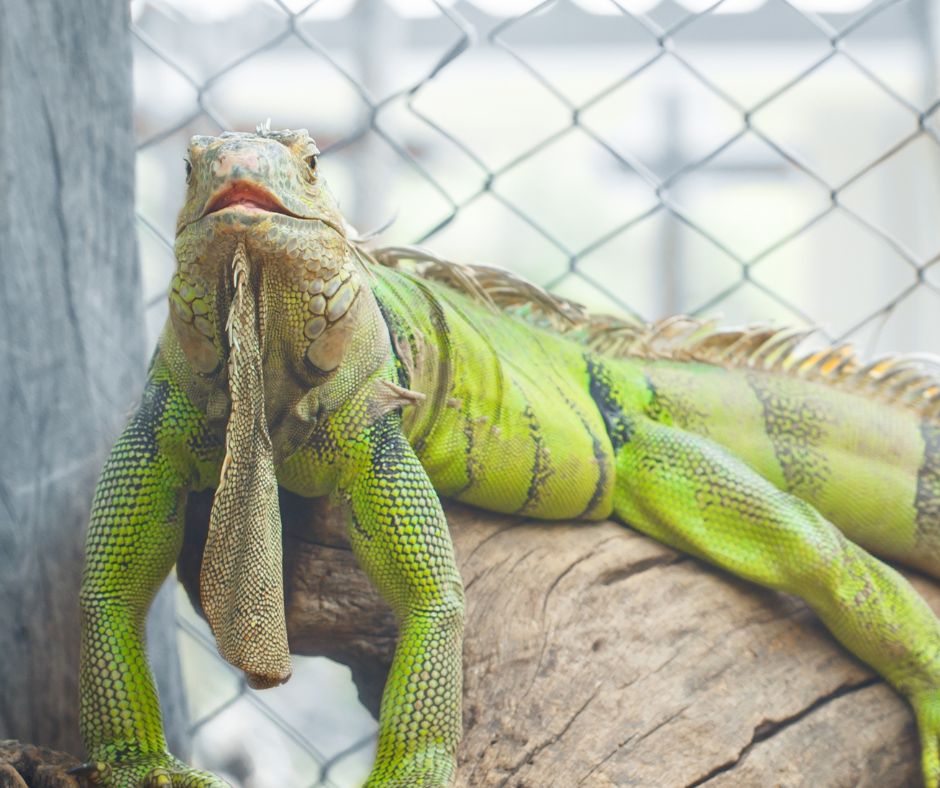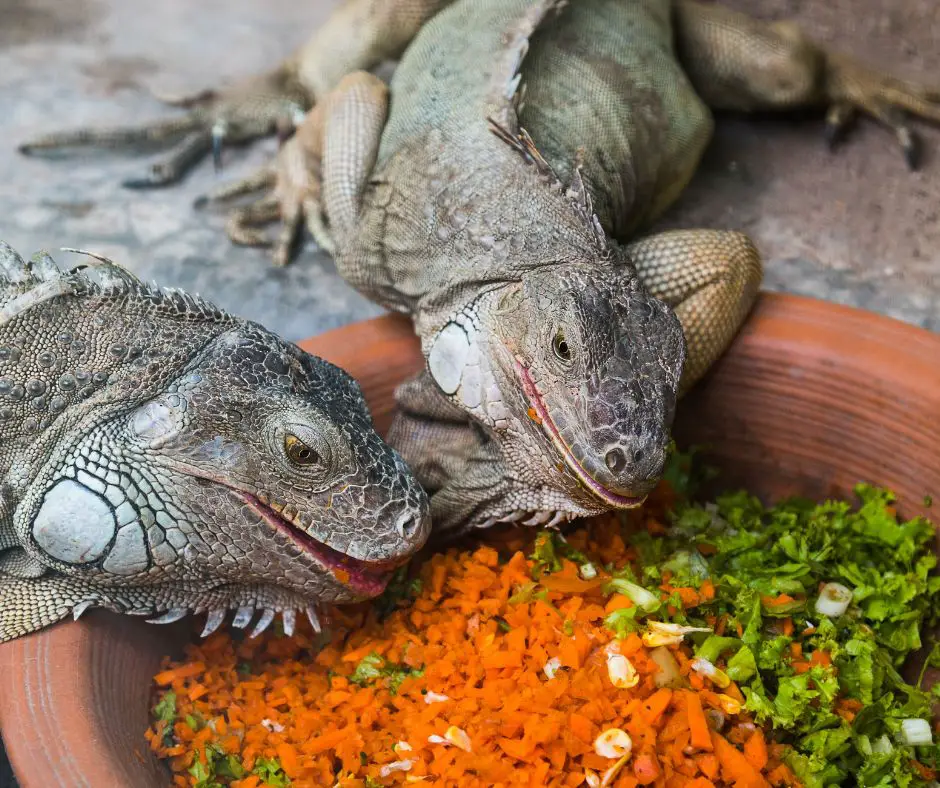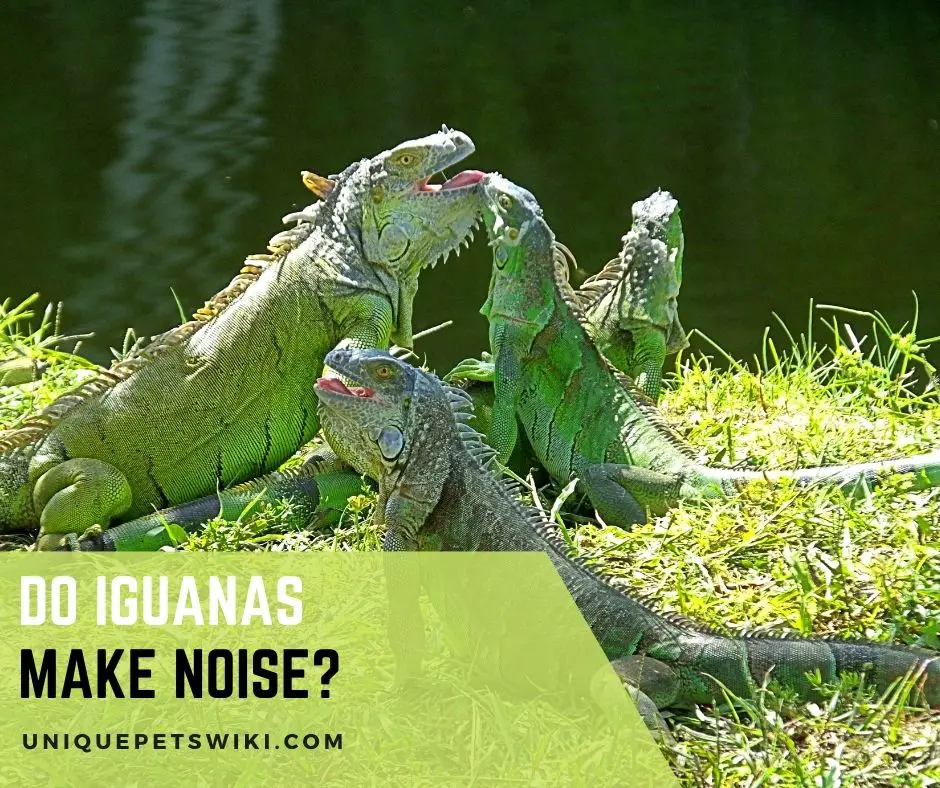When you have an iguana as a pet, you will learn many interesting things about the species. One of the many questions people interested in iguanas ask is ‘do iguanas make noise?’
You might have even seen videos of Iguanas making interesting sounds like chirping, grunting, coughing, or purring.
But do Iguanas vocalize? Do they make these noises all the time? What are the reasons or causes behind these noises?
Let us find out…
Contents
Do Iguanas Make Noise?

There are different species of iguanas and they all have different methods of vocalization. However, most iguanas are very quiet and do not vocalize. Even wild iguanas might only occasionally make a whistling sound – while running along trees.
Pet or captive iguanas don’t have any reason to vocalize in captivity so they are generally silent all the time. Mostly they use their body language for communication. Occasionally, they might cough, purr, or make a chirping sound. But this is extremely rare and they mostly stay quiet. Marine iguanas are even quieter than green iguanas.
If you are looking for quiet pets that don’t make too much noise, iguanas can be a great choice. In case you want an interesting pet that vocalizes a great deal, then an iguana might disappoint you!
What Sound Does an Iguana Make?
The sounds an Iguana makes depend on the situation or the circumstance. Owners have noted sounds like wheezing, coughing, purring, clicking, chirping, and rasping. Let us study these in detail:
Coughing/sneezing
To cough, your pet iguana will open its mouth, shake its head, and make a human-cough-like sound. Most iguanas cough right after eating food. They usually do this if they have eaten a lot of food hurriedly.
Sometimes, an iguana might sneeze or cough to expel salt (sodium acquired through a diet of fruits) or snot from its nostrils. Iguana snot is a watery or gritty discharge that helps remove debris and mucus from the respiratory system.
In most cases, coughing is normal as long as your iguana is fine otherwise and eating normally. If you hear or see your pet coughing occasionally, it is nothing to worry about. (However, it is important not to go close to it when it coughs. Their snot could transmit bacteria, so it is best not to get it on your skin.)
If your iguana’s coughing persists, it could be due to a respiratory issue or sickness that needs medical help. Do not waste time, and call your vet right away.
Wheezing/Rasping/Breathing Heavily
Wheezing or rasping is another sound Iguana owners dread.
If your Iguana is wheezing or seems to have difficulty breathing please observe your pet for signs like twitching, muscular weakness, paralysis, reduced appetite, lethargy, etc. Also, check its body for lumps and bumps along its spine and tail and its limbs for angular deformities.
If none of these other signs are present, then check your pet’s enclosure parameters – temperature (cool/warm side and basking side), UVB lighting- when was it last changed, humidity, etc. What is your pet’s diet? Has it had calcium and magnesium supplements?
Wheezing is usually indicative of respiratory infection. It could occur due to a poor environment and microbial agents (bacteria, viruses, etc). Since respiratory illness is potentially life-threatening, you must see your vet immediately.
If your Iguana is stressed due to a poor environment, it might breathe heavily while also thrashing its tail. It might also make an attempt to escape the enclosure. Please re-check the temperature and humidity and make adjustments as required.
Hissing/Barking/Chirping
Hissing, barking, or chirping are sounds your Iguana might make at night to threaten, intimidate or warn off predators. Iguanas also chirp or hiss when they are unhappy or upset.
It is best not to handle your iguana when it is hissing or chirping. It will not hesitate to bite and that could transmit salmonella infection and is also very painful.
Have you made any changes to your iguana’s enclosure? Is another iguana threatening it? You might want to separate the two animals if this behavior persists.
Purring/Grunting
Yes, Iguanas sometimes purr like a cat! Check out below video wherein the iguana grunts a couple of times and then starts to purr as its owner affectionately touches it.
Iguanas are affectionate creatures. Purring and grunting are sounds Iguanas make to show affection to their humans.
Some iguanas also purr or grunt to impress members of the opposite sex.
Gurgling/Spluttering/Bubbling
If the gurgling occurs when your iguana is drinking water, then it may be a one-off thing. Some iguanas gurgle before swallowing water. This may be due to water or food getting stuck at the back of its throat. Worry not, your pet should be fine.
If however, your iguana gurgles and splutters continuously – especially while eating food – please try to asses if the gurgling sound is coming from its chest. (You can hold your pet gently ad place your hand on its chest).
Continue monitoring your pet – if the gurgling continues and your pet seems very restless, please take it to the vet immediately. This could be a sign of a chest infection and your pet will probably need antibiotics to eliminate it.

How Do Iguanas Communicate?
Iguanas are social creatures. In the wild, they live in groups and use various methods of communication. Yes, there is aggression but they still maintain healthy mating and breeding practices to maintain their populations.
Iguanas communicate chemically and visually. They have special pores on their hind legs which secrete lipids and proteins. These help them attract mates and mark territories.
Iguanas also use their tongues and an organ called the Jacobson’s organ in the roof of their mouth to identify scent marks. They also use feces to communicate. They tongue-flick the feces of other iguanas to communicate territory and understand the signaler’s reproductive condition, health, and body condition.
Other than these methods, iguanas also use their body language to communicate. In particular, they use head bobs (mainly during mating season) to show aggression to competitors and to attract mates. Larger males also turn sideways to appear larger and show how big they are. Head bobbing, gaping, jaw wrestling, and fighting are displayed by both wild and captive iguanas.
FAQs
Do iguanas vocalize?
Iguanas do not vocalize much as they have other means of communication. However, occasionally, they may use sounds like purring, wheezing, coughing, etc. either to communicate or indicate a health issue.
Why do iguanas chirp?
Iguanas chirp when they feel threatened or when they want to intimidate or warn off something or someone. They may also chirp if they feel upset or unhappy about something.
Are iguanas loud?
Iguanas are very quiet animals. They rarely make any noises or sounds and neither do they vocalize.
Do iguanas remember you?
Iguanas recognize their owners by their sight and sound. They have sharp vision and can see clearly. Iguanas also get attached to their owners.
Do iguanas bite?
Yes, iguanas can bite their owners. They usually bite out of self-defense. The bite can be rather painful, so please exercise caution.
Wrapping Up – Do Iguanas Make Noise?
Iguanas are usually very quiet pets. They do not make too much noise and neither do they vocalize. Iguanas might occasionally make sounds like wheezing, coughing, sneezing, or chirping, mostly to indicate some health issue.
You must not ignore your iguana’s wheezing or coughing – especially if it persists It could be due to a chest infection or might even stem from environmental issues like improper temperature, humidity, etc. It is best to consult a vet under such circumstances.
